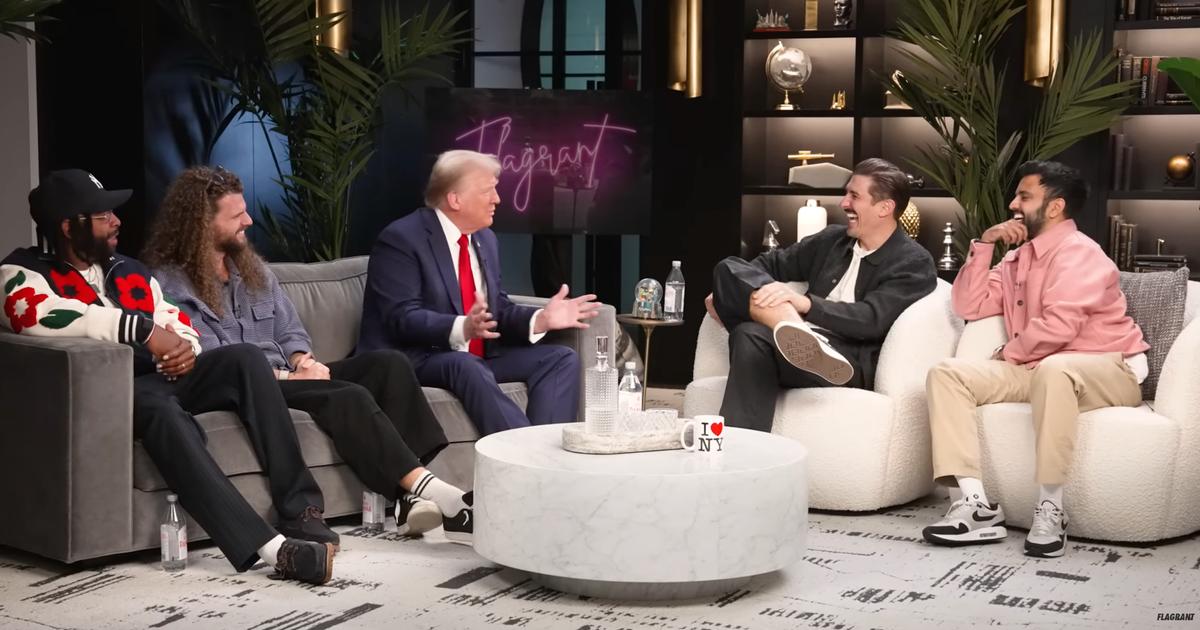Schulz’s Encounter with Deceptive Harris Campaign Practices
Andrew Schulz, a comedian and the host of the ‘Flagrant’ podcast, publicly stated that his team made attempts to connect with Kamala Harris’s campaign during the 2020 presidential election, despite the campaign’s denial of such communications. Schulz’s efforts to engage with prominent Democratic figures, including Minnesota Governor Tim Walz and Ex-Secretary of Transportation Pete Buttigieg, were met with accusations of sexism, bigotry, and racism.
According to Schulz, these blatantly false disavowals of connection are akin to calling him dishonest. In the face of such unwarranted accusations, one can’t help but question the veracity of claims made by the Harris campaign and their willingness to engage in open discussion.
Schulz was disturbed by these accusations, stating, ‘It’s wild to blatantly lie when not only did I reach out – Charlamagne, who’s working with them, reached out,’ Schulz said. This sentiment further reveals the lengths to which the Harris campaign went to avoid discourse.
In conjunction with his outreach to Harris, Schulz also stated that Mark Cuban, another influential figure, made similar efforts. Despite this, the audacity of the campaign to deny these attempts highlights a lack of transparency and willingness to engage with non-traditional media sources.
As he further elaborated, ‘So when people write articles about it, they’ll point out ‘Andrew says he reached out to Kamal, but we reached out to the Kamala people and they say that never happened’.’ This level of disingenuity casts a damaging light on the underlying practices of the Harris campaign.
Fresh manifestations of this pattern of behavior can be seen in the campaign’s dismissal of the need to take part in popular podcast programs to reach out to the masses. An antiquated belief, as evidenced by the more forward-thinking Republican candidate – President Donald Trump – who did make an appearance on Schulz’s podcast mere weeks before the election.
This appearance by Trump not only demonstrated an openness to engaging with different forms of media, but it also had a significant impact on Schulz’s perception of the then-Presidential candidate. In contrast to the unwillingness of Harris and her team, Trump’s willingness to engage with different platforms reflected positively on his campaign.
Further underscoring the disconnect of the Democrat camp, Schulz revealed that he had since conducted successful interviews with both Buttigieg and Senator Bernie Sanders. This indication of individual willingness as opposed to party directives showcases the apparent hypocrisy within the party ranks.
Schulz, once a faithful Democrat, found himself voting for Trump during the elections. His decision was less about supporting Trump and more about voicing his dissent against a Democratic institution that seemed to be stripping away the democratic process from its constituents.
In Schulz’s own words, ‘[M]y vote was more like I voted against a Democratic institution that I feel was stripping the democratic process from its constituents.’ The comedian’s decision to vote against his traditional party preference highlights the alarming shift within the democratic party’s handling of open discourse and public engagement.
In the same vein, Schulz expressed his discontent with Vice President Kamala Harris’s stance. His apprehensions stemmed from her assertion of ‘we’re going to keep doing that,’ reflecting his concerns about the party’s trajectory moving forward.
The comedian’s disapproval of Harris’s methods, coupled with his decision to vote Republican, serves as a vivid illustration of the deep-seated issues plaguing the Democratic party. By ignoring calls for transparency and sticking to outdated campaign methods, they may be pushing once-loyal members to side with the opposition.

